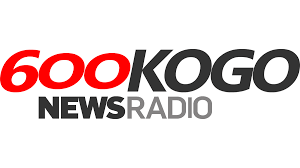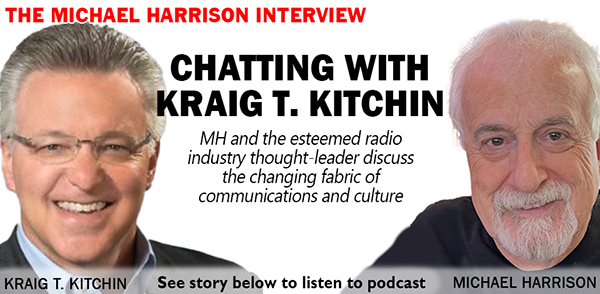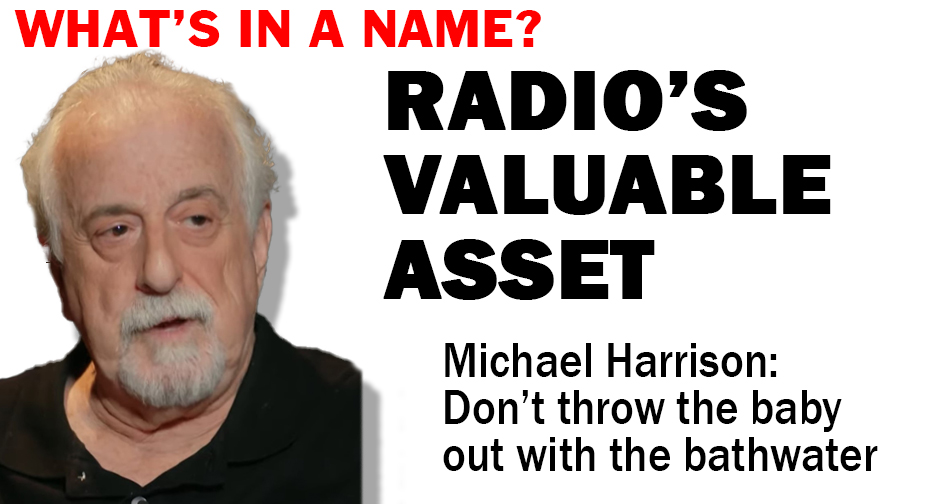SABO SEZ: What You Need to Know About the “Law of 200”
By Walter Sabo
a.k.a. Walter Sterling, Host
WPHT, Philadelphia, “Walter Sterling Every Damn Night”
and TMN syndicated, “Sterling on Sunday”
 The risk is real. Suggesting that a technique used with great success in the recent past might be beneficial to the present is a perilous course. Is the idea out of touch with today’s reality? Is the author ignoring current trends?
The risk is real. Suggesting that a technique used with great success in the recent past might be beneficial to the present is a perilous course. Is the idea out of touch with today’s reality? Is the author ignoring current trends?
A factual current event from which our industry and our lives suffer: Sales are down. Sales for the radio industry are down every quarter.
Hard research-and-math-people will point to the usual causes. Add to that list the fact that the same dollars that bought spots priced at X for the big morning show are being fed into podcasts for 10 percent of X. But podcasts are digital! Therefore, they are sexy to Wall Street. The result of that dollar transfer is quarterly investor calls featuring CEOs declaring that “digital is a sweet spot.” Actually, “digital” is a cheap whore but back to the topic:
Methods deployed to sell radio today are not working. Salespeople work hard, but the strategies they are given are weak. That’s why sales are down – every quarter. Spreadsheets, ROI, CPP, programmatic are elegant math-major systems. But our product is not math. Our product is emotion. Match sales techniques to the product. Tap the power of emotion.
Everything is ultimately purchased from our emotions. Everything. Case in point: Joe Girard* understands cars better than anyone in history. No, no, don’t be dismissive of Joe because he was a car salesman; cars are very expensive. Cars have impacted you and your family for years. Cars make you feel great or awful. Powerful purchase.
Happy Birthday! One month a year, Joe would mail out a birthday card to all of his past customers and all of his prospects. All of them. In the same month. One out of 12 recipients were thrilled that Joe remembered their birthday! The other 11 would call Joe and tell him that he had their birthday date wrong. They called Joe. A car salesman.
Joe gave all of them information on the phone about the latest models and deals for… a new car. They called Joe.
The Law of 200. Catholic funeral masses hand out prayer cards featuring a photo of the deceased. Ask a priest how many cards are printed. The answer is 200. Caterers will tell you that the standard number of wedding guests is… 200!
Seems we know 200 people who will come to our wedding and our funeral. Major life events. Buying a car is a major, emotional life event. Joe realized that if he sold a good car, 200 people would learn that the customer was satisfied.
OR 200 were not happy. He gave all car buyers a box, a box of his business cards. 200 cards. He urged customers to hand out Joe’s cards to their friends.
Do those 22-year-old time buyers still want concert tickets, merchandise, meals, autographs, meet and greets? Before the power point presentation starts, book the good seats.
Yes, our product is emotion driven. How many arguments have you had about music repetition? New music? Controversial topics? Borderline morning show jokes? Those are emotional not intellectual discussions. There’s our power – in the center of the rink. Put the commercial on the mat.
* How to Sell Anything to Anybody by Joe Girard https://a.co/d/fTpuzoZ
Walter Sabo has been a C Suite action partner for companies such as SiriusXM, Hearst, Press Broadcasting, Gannett, RKO General and many other leading media outlets. His company HITVIEWS, in 2007, was the first to identify and monetize video influencers.. His nightly show “Walter Sterling Every Damn Night” is heard on WPHT, Philadelphia. His syndicated show, “Sterling On Sunday,” from Talk Media Network, airs 10:00 pm-1:00 am ET, and is now in its 10th year of success. He can be reached by email at sabowalter@gmail.com.



 There are two broad categories of thought: Task. Creative. When in creative mode, a person innovates, imagines, plans, and solves problems. An idea bank is a bank! Money grows from the results of imagination: new products, new music, new formats, new sales strategies. Business growth depends on new!
There are two broad categories of thought: Task. Creative. When in creative mode, a person innovates, imagines, plans, and solves problems. An idea bank is a bank! Money grows from the results of imagination: new products, new music, new formats, new sales strategies. Business growth depends on new! Broadcasting weekdays 5:00 am to 9:00 am PT, the show delivers what station sources describe as “unmatched news coverage of the critical stories shaping the community.”
Broadcasting weekdays 5:00 am to 9:00 am PT, the show delivers what station sources describe as “unmatched news coverage of the critical stories shaping the community.”  The program has a reputation for being a trusted news source dedicated to delivering timely and accurate coverage tackling everything from local and national news to business, entertainment headlines plus traffic and weather reports. Known for her warm delivery and engaging storytelling, Carter’s distinguished career includes roles at major news outlets such as WBBM in Chicago and Newsradio KFBK in Sacramento, where she became known for her sharp reporting and ability to connect with audiences. She will report to PD Mary Ayala who tells TALKERS, “I’m thrilled to welcome Veronica to our team,” adding, “Her depth of experience, vibrant enthusiasm and passion for connecting with the people of California make her a great addition to our morning show.” Carter comments, “I’m honored to join such a respected team and excited to connect with our listeners each morning, bringing them the news and stories that matter most.” Carter replaces LaDona Harvey, who announced she was stepping down from the role earlier this month.
The program has a reputation for being a trusted news source dedicated to delivering timely and accurate coverage tackling everything from local and national news to business, entertainment headlines plus traffic and weather reports. Known for her warm delivery and engaging storytelling, Carter’s distinguished career includes roles at major news outlets such as WBBM in Chicago and Newsradio KFBK in Sacramento, where she became known for her sharp reporting and ability to connect with audiences. She will report to PD Mary Ayala who tells TALKERS, “I’m thrilled to welcome Veronica to our team,” adding, “Her depth of experience, vibrant enthusiasm and passion for connecting with the people of California make her a great addition to our morning show.” Carter comments, “I’m honored to join such a respected team and excited to connect with our listeners each morning, bringing them the news and stories that matter most.” Carter replaces LaDona Harvey, who announced she was stepping down from the role earlier this month. nominees to be voted upon by industry personnel later this year, leading to the selection of the 2024 Radio Hall of Fame Induction Class. Kraig T. Kitchin, co-chairman of the Radio Hall of Fame, comments, “The input from fellow radio industry members and listeners alike helps our nominating committee contemplate so many more individuals worthy of a nomination. We’re grateful for the input and the ideas offered.”
nominees to be voted upon by industry personnel later this year, leading to the selection of the 2024 Radio Hall of Fame Induction Class. Kraig T. Kitchin, co-chairman of the Radio Hall of Fame, comments, “The input from fellow radio industry members and listeners alike helps our nominating committee contemplate so many more individuals worthy of a nomination. We’re grateful for the input and the ideas offered.”
 There are media and there are media. There are platforms and there are platforms. Not all cultural artifacts are equal in terms of their utilitarian versus cultural value. Damn the tone-deaf corporate bean counters who are ripping the heart out of the spirit that gives humanity its life force! Marketplace obsolescence should not solely be determined by profit and loss. With all due respect to the idea of public service, what about the concept of loyalty? Shame on the automobile industry! Not only is it turning its back on the needs of millions of people, it is in the process of betraying one of its historic partners in not only commerce – but romance and glory. In other words, the automobile industry owes the radio industry a huge debt. The relationship between cars and radios goes a century deep and has been nothing less than a two-way street. Yes, auto industry, don’t be so hasty to save a few bucks by rushing AM (and then FM) radio out the door. You might just find in the long run that “radio” outlasts the private “car” as a fixture of human activity.
There are media and there are media. There are platforms and there are platforms. Not all cultural artifacts are equal in terms of their utilitarian versus cultural value. Damn the tone-deaf corporate bean counters who are ripping the heart out of the spirit that gives humanity its life force! Marketplace obsolescence should not solely be determined by profit and loss. With all due respect to the idea of public service, what about the concept of loyalty? Shame on the automobile industry! Not only is it turning its back on the needs of millions of people, it is in the process of betraying one of its historic partners in not only commerce – but romance and glory. In other words, the automobile industry owes the radio industry a huge debt. The relationship between cars and radios goes a century deep and has been nothing less than a two-way street. Yes, auto industry, don’t be so hasty to save a few bucks by rushing AM (and then FM) radio out the door. You might just find in the long run that “radio” outlasts the private “car” as a fixture of human activity. from digital sales in 2023 and more local ad revenue coming from video streaming than audio streaming spots.” RAB president and CEO Erica Farber comments, “Digital continues to be the catalyst for growth in today’s environment. A solid foundation in digital is a key driver for today’s successful marketing professional. As technology evolves, revenue and sales gains can only be obtained via digital services and training know-how. RAB continues to provide the training, tools and services needed to realize these gains.” The annual report shows that digital sales in 2022 comprised 19% of total ad revenue, representing between $85,064 for the average small-market station and $1.2 million for a station in a large market. Some market clusters were making tens of millions of dollars from digital ad sales. The full report – an analysis of online ad revenue from 3,753 radio stations, as well as survey responses from 851 local radio buyers and 169 radio managers – is available to RAB members.
from digital sales in 2023 and more local ad revenue coming from video streaming than audio streaming spots.” RAB president and CEO Erica Farber comments, “Digital continues to be the catalyst for growth in today’s environment. A solid foundation in digital is a key driver for today’s successful marketing professional. As technology evolves, revenue and sales gains can only be obtained via digital services and training know-how. RAB continues to provide the training, tools and services needed to realize these gains.” The annual report shows that digital sales in 2022 comprised 19% of total ad revenue, representing between $85,064 for the average small-market station and $1.2 million for a station in a large market. Some market clusters were making tens of millions of dollars from digital ad sales. The full report – an analysis of online ad revenue from 3,753 radio stations, as well as survey responses from 851 local radio buyers and 169 radio managers – is available to RAB members.